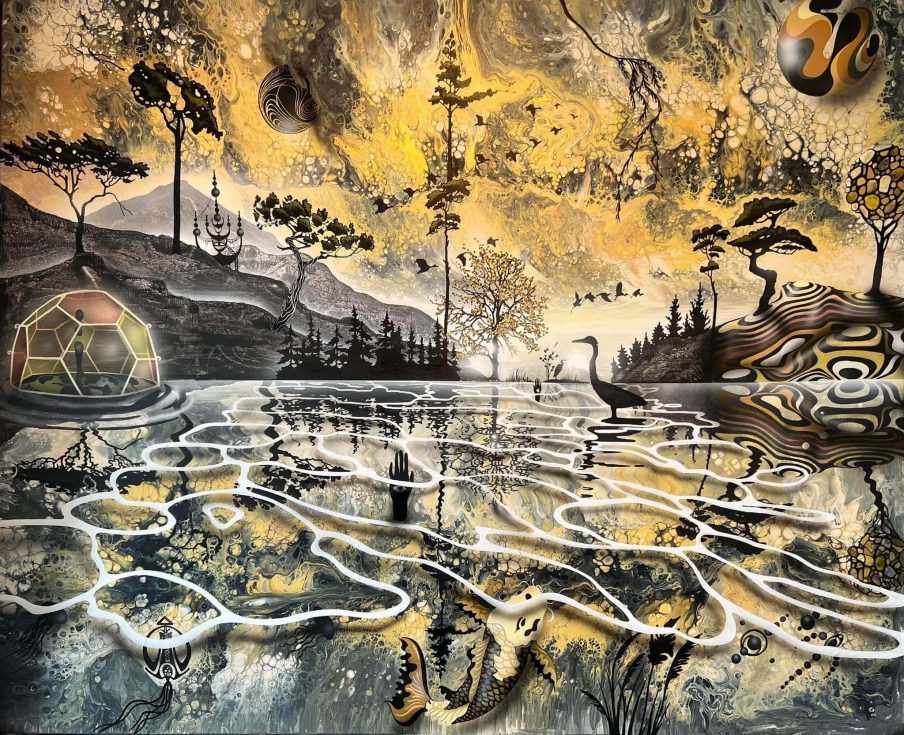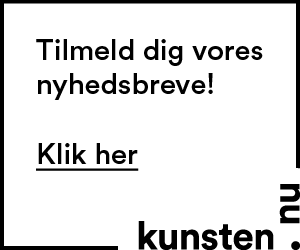
Betalt indhold
Pressemeddelelse:
Galleri Christoffer Egelund is proud to present our third solo show with Jonas Pihl: Random Determinism. Jonas Pihl combines spirituality, mathematical order and the chaotic in his works, where the disparate comes together to create a greater whole. You can experience his newest paintings at Bredgade 75 in Copenhagen from the 25th of August to the 15th of September 2023.
Jonas Pihl is an artist operating in the field between order and chaos. Inspired by both physics, math, art history and spirituality, he allows mathematical precision and randomness to create unique harmonies, allowing the divinely ordered to be further developed by the power of the arbitrariness.
The balance between order and randomness, between chaos and cosmos, has always been interesting to us humans. In the earliest human religions, regularly performed rituals were meant to maintain universal order and stave off chaos. In the 6th century B.C., the same Pythagoras who discovered the famous theorem discovered that there is a simple mathematical relationship between harmonic notes in music. This discovery led to the idea of the music of the spheres: Divine music produced by the movements of the planets, producing an all-pervading invisible order based on mathematical principles that structures the universe. The idea of the universe being structured by divine mathematical principles was to dominate the following centuries, from Antiquity, where a canon of proportion was the measure of good art, to the Middle Ages, where the grand cathedrals were constructed in a way that incorporated the very same fractions that Pythagoras found to be governing music into the construction of the building itself.
In the Renaissance of the 14th and 15th centuries, the invention of mathematical perspective allowed artists to incorporate this divine order into their art to an unprecedented degree by imitating the look of the physical world using math and geometry.
In the 17th century, the idea that our world is governed by in invisible order whose nature is mathematical manifested itself in Isaac Newton’s discovery of the laws of motion. Newton found that any motion could be described with the help of 3 equations, whether it be the movement of an object here on Earth or the movements of the planets. For the first time, this allowed humanity to accurately describe and even predict astronomical phenomena and events. Newton’s discoveries and the way of thinking they represented was the catalyst that led to the wealth of scientific advancements that mark the 18th century, which came to be known as The Age of Enlightenment.
In the beginning of the 20th century, the observation that light behaves sometimes like waves and sometimes like particles resulted in the discovery of quantum physics. A very important element in quantum physics is the realization that physical phenomena are actually affected by the fact that we measure them. Whether, for instance, a particle is at a certain position in space at a certain time is not something that has a fully determinable answer before you measure its position, and all we can describe is the probability that it will at a certain place at a certain time. So maybe the universe is not as mechanically predictable as we think.
This tension between chaos and divine order is made visible by Jonas Pihl’s art. His subjects are depicted in a perfect perspectival space, which is emphasized by the fact that we look out towards the horizon line. His main subjects – birds, trees, fish – are depicted using sharp edges, leaving no possible doubt as to their position – they exist within the system of order. But underneath everything is the dreamy, swirly background created by the random patterns that appear when you pour paint onto the canvas. Jonas Pihl lets these patterns inform which subjects are painted and where. Furthermore, the motif of the fractal is present throughout his art in the branches of trees and in branching patterns. A fractal is a geometric shape which repeats the same pattern infinitely, event if you zoom in closely, cementing that even in the brute matter of the paint on the canvas, order often manifests itself.
Even though Jonas Pihl’s art is thus marked by the tension between two opposites, it does not constitute a universe where polar opposites are meant to fight each other. Even though chaos and order are diametrically opposed, in Jonas Pihls art, they come together to create a new whole which couldn’t exist without either. Thus, the notion of friendly harmony is central to Pihl’s works. Here, the orderly perspective and the arbitrary patterns of the background are capable of fusing into something greater by virtue of the very fact that they are different. It is often said that a movie or a book needs conflict to drive the plot forwards – otherwise it won’t be much of a plot. Here, conflict becomes the be-all and end-all of the work. The same is true in many areas of life: in politics, games, sports. But maybe it doesn’t have to be that way, and maybe there is quite a lot to gain by trying to see things differently. Maybe two opponents in a debate can be right at the same time, and maybe opposing concepts can both have a level of truth to them – because maybe, truth is more complex than concluding that it’s either this or that. That is the truth in Jonas Pihl’s works, where the 2D surface and the 3D space, chaos and cosmos, randomness and predictable patterns come together to create something greater than the sum of its parts.
Jonas Pihl graduated from The Royal Danish Academy of Fine Arts’ MFA programme in 2008. His art has been exhibited at galleries across Europe and the US and is featured in prominent collections like those of Kunsten Museum of Modern Art, Københavns Kommunes Kulturudvalg, Martin Nielsen Collection and Jens Peter Brask Collection. In 2018 he was commissioned to create the largest mural in Northern Europe, Tvillingerne, in Aalborg.
Dette indhold er produceret i samarbejde med et udstillingssted som en del af udstillingstedets Artguide-abonnement hos kunsten.nu.
Kunsten.nus uafhængige redaktion har intet at gøre med indholdet.
Bredgade 75
1260 København K
Ons-fre 15-18
Lør 12-16 og efter aftale
Gratis entré
+45 33939200

